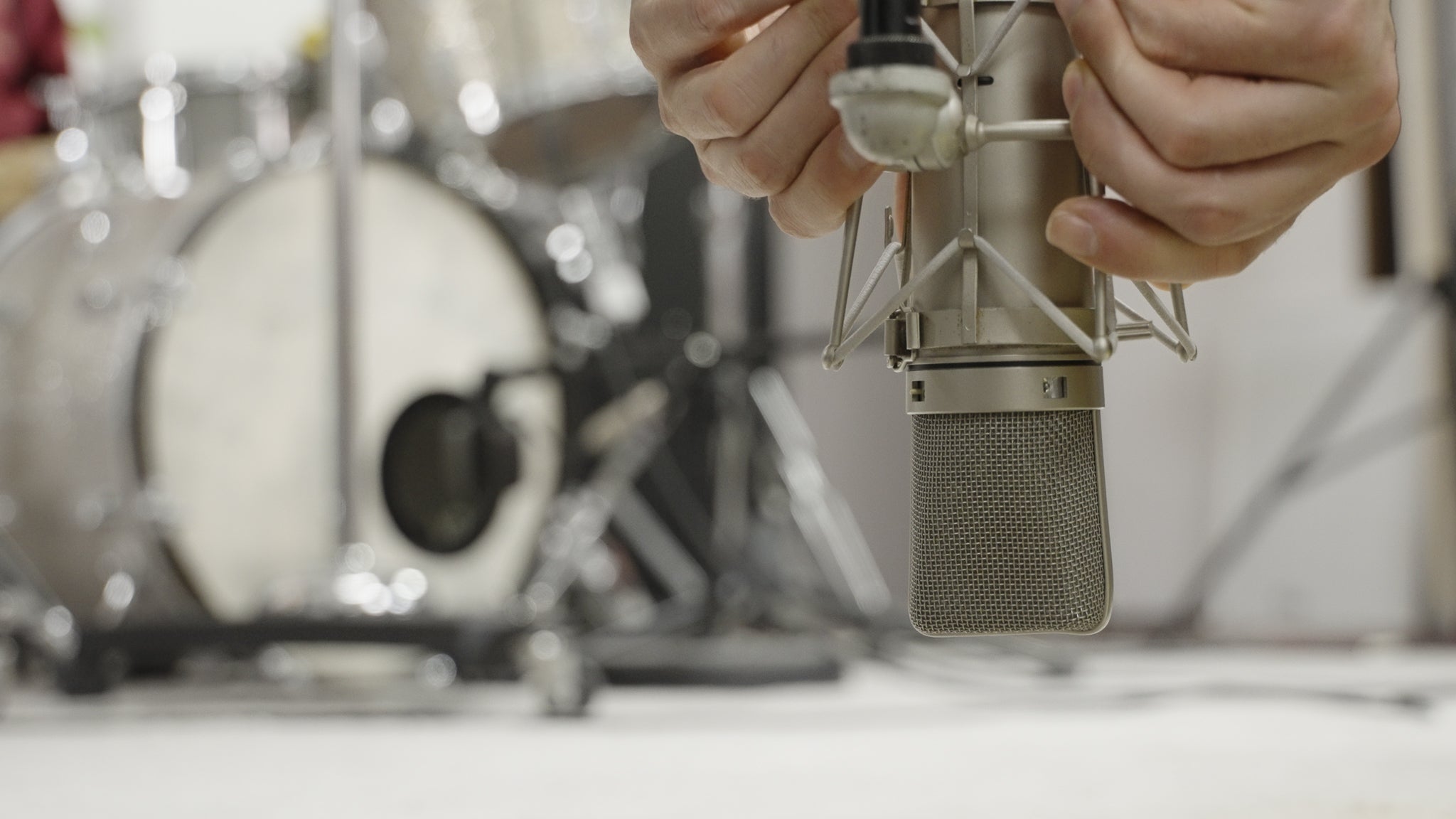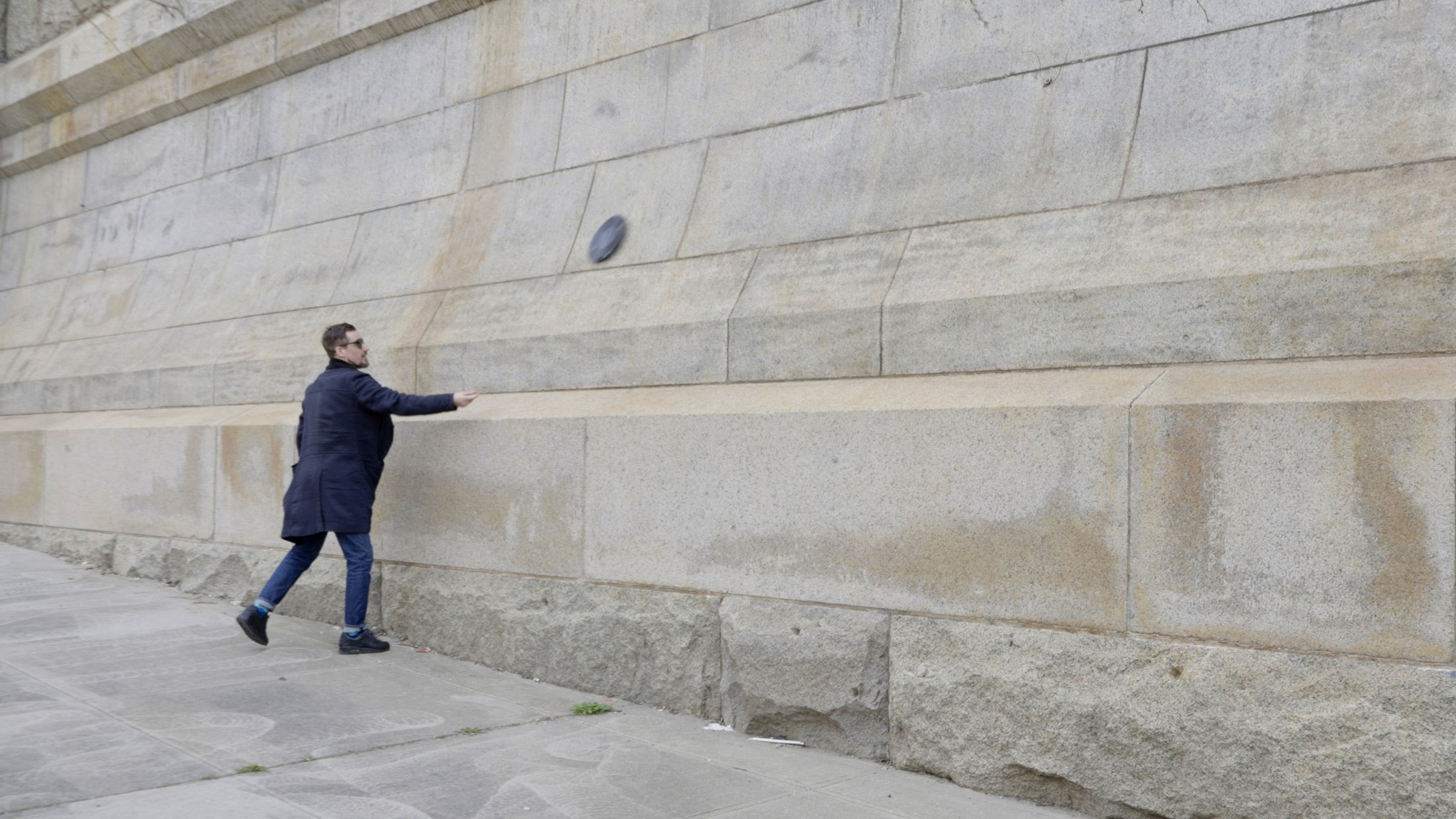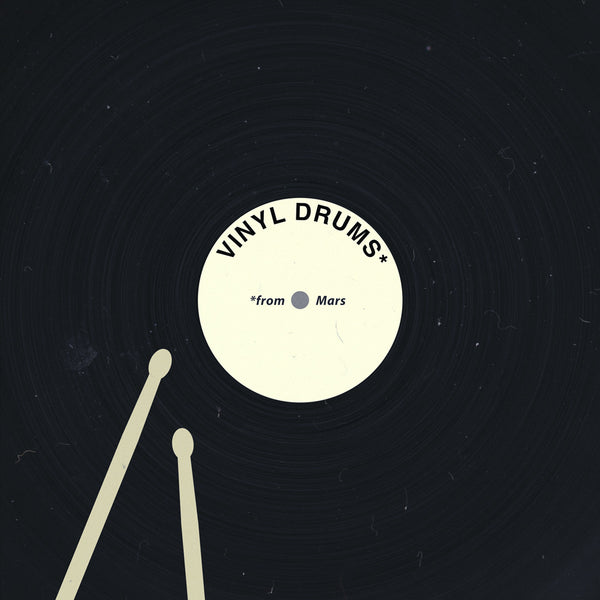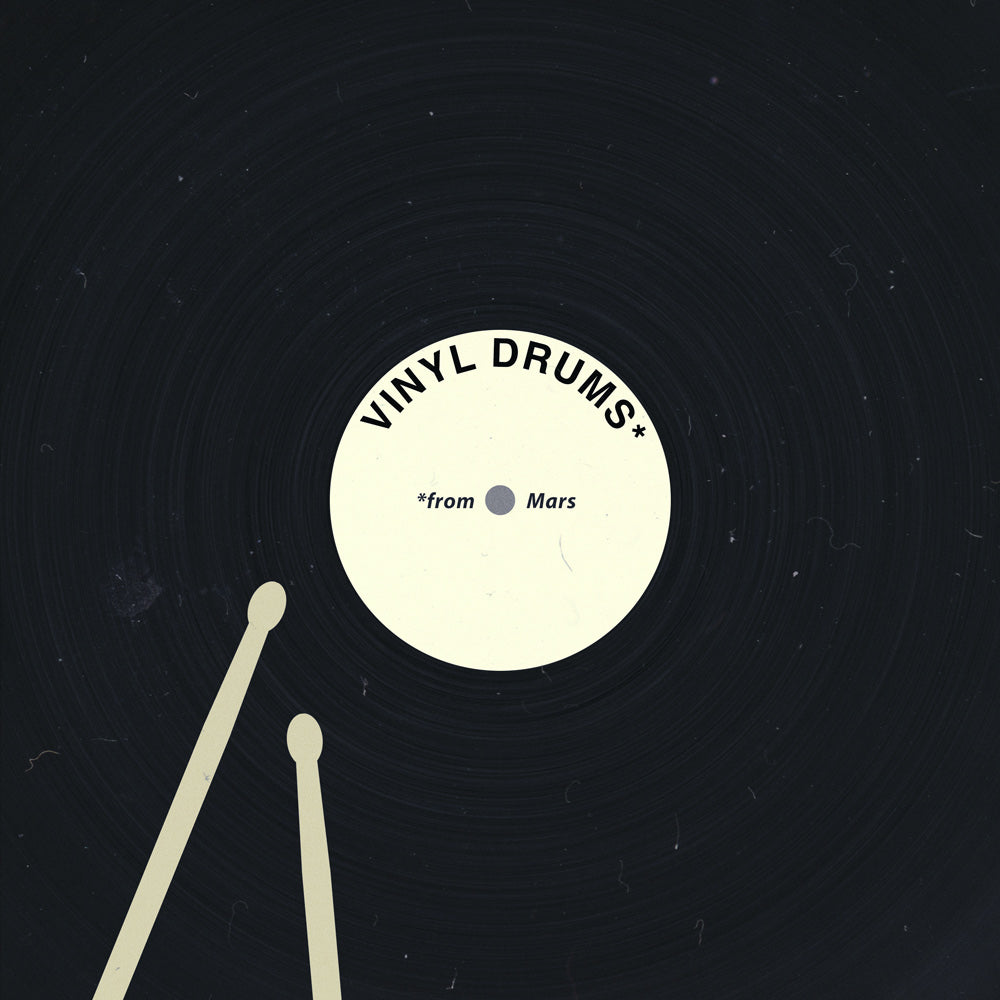VINYL DRUMS FROM MARS
$39.00 $19.50
Acoustic Drums & Percussion Cut To Vinyl and Sampled
Vinyl Drums From Mars is a collection of acoustic drum and percussion one hits created from scratch, cut to vinyl and sampled. Our most epic project to date, this pack is a love letter to the art of sampling, and pays tribute to the classic and irresistible sound of drums sampled off of vinyl. You'll get everything from clean, dead and dry, classic vinyl drums, to dusty and degraded, dirty and effected, and completely unexpected sounds.... All royalty free, of course 😉.
The Sound of Vinyl
Drums sampled off of vinyl changed the landscape of music forever after - laying the groundwork for hip hop, house and countless other sample-based music styles. It's true that the sound of vinyl can bring many benefits - it can harden a funk snare into a hip hop hit, add dust, flavor, and lovely noise which allows drums to cut through a mix. Like tape, it's a medium that can just make things sound "better".

But unfortunately, sampling vinyl comes with many drawbacks. Often in a piece of music, you're limited to just one or two isolated drum hits (good luck finding cymbals) that probably don't fully decay before another element comes in. That open snare you found probably had other tracks playing on top of it which increased the noise floor (admittedly cool sometimes).
Plus, you're digging through the same records as others, so it can be difficult to find fresh sounds that haven’t already been sampled (or that won’t land you with a pricy lawsuit 😱).
Recording the Source Material
Our goal was to capture the magic of vinyl drum one hits without being constrained by these limitations. We chose to create a record of only acoustic sounds, because it allowed us to sculpt everything from scratch, physically, by tuning drums, hitting them certain ways, and capturing everything through mics to tape, thus achieving the highest possible quality and image. We also love the idea of constraints: How can we create a diverse vinyl library from only our in-house drums and percussion?
Our vintage late 1960s Rogers kit (20” kick, 16” floor tom, 13” rack tom) is one of the best sounding drum kits we’ve ever heard. It sounds punchy and tight, and has a huge amount of character. (Hey, we did try 8 drum kits before buying it!).

Being inspired by funk records and the people who sampled them, we knew the Rogers was ideal. First, we multi-sampled the kit cleanly, as it'd be played in a session (letting the drums ring off each other), using an array of vintage and modern microphones, tracking through tube preamps, into our API 1608, to tape, and finally the computer.
We took the bottom heads off of the kick and toms to get the purest fundamental tone, mic'ing it from underneath with dynamic mics for the main body of the sound, and then blending that with an overhead condenser, for the tone of the drum. Mic'ing the inside of the drum gives us maximum isolation from the top of the toms, which allows the overhead to blend seamlessly (no phasing or overlapping frequencies).
Then, we captured all of the percussion in our studio to complete the transcription of our in-house setup. This included all types of shakers, 2 tambourines, 2 cowbells, 2 woodblocks, 3 claves, a triangle, sticks, snaps, and claps, tracked with a vintage MD421, U87, and a Coles 4038.

Once we'd achieved a solid, dry kit, we set out to create a grab bag of one-off drum hits, going for the widest variety of sounds possible, using different snares, tunings, cymbals, sticks, muffling etc. We de-tuned heads, flipped drums upside-down, brought snares into the bathroom, stacked cymbals on each other and drums, used dry erase markers instead of sticks - you get the picture.

Then, we processed selections of these sounds to our heart's delight, seeking to recreate the strange, often over-processed sound of vinyl drums and their inherent artifacts. Our goal here was also to explore how different types of processing would take to the vinyl medium.
The Mastering Sessions
Months later, we had everything we needed, and sequenced all of the drum hits, along with some extra silence (for vinyl static) into two-track bounces. We volume-ized every hit, to achieve different levels of vinyl noise floor.
Then, we headed to two different mastering studios and cut the acetates cleanly, with no processing, to preserve the intended (and wide-ranging) dynamics and color of the already sculpted (or purposefully un-sculpted) sounds. This was a completely different process than the engineers were used to, as we weren't optimizing music for playback on different systems (they probably thought our record sounded really boring tbh!).
Cutting the Acetate, or "Dub Plate"
An acetate, also referred to as a "dub plate" by DJs, is a test pressing that the artist can listen to, to approve the record for production. What's special about these acetates is that they are cut with a lathe, rather than pressed, and because the material is more fragile, they degrade a bit with each play, which is exactly what we wanted for this project.
We cut (2) 12” 45 RPM records to emulate the higher quality sound and deeper bass of 12” singles that only have one or two tracks per side, and sampled the results cleanly through mastering grade conversion for the cleanest possible transcription of the first play of the acetate.
Sampling the Vinyl In-House
It's great to sample a record cleanly, but it's way more interesting to see how many ways you can change (and F*#K up) the sound of the acetate physically. You can wear it out (playing it 30 times!) and hear all types of degradation. But you can also manipulate the speed of the turntable, changing the fundamental frequency of drum sounds to add a huge amount of diversity to the sample collection. And, by controlling the record by hand, you can and add pitch modulation to create all sorts of blips, vinyl FX, and percussive artifacts.

Swapping out Cartridges, Phono Stages and Turntables
The first way the sound of the record is captured is by the needle (essentially a microphone), so it stands to reason that different needles can affect the sound greatly. For our clean cartridge, we used an Ortofon 2M Red, with a dedicated phono preamp, to capture the punchiest dynamics possible.
But while these hits had punch, they lacked the classic distortion on kicks, hats and snares, that help turn an acoustic hit into a hardened Hip Hop hit. So we turned to our trusty Shure M447, which gave us lovely low end distortion we've come to love on so many records. We used 3 different turntables here, and paired them with various DJ mixers, both low and hi-end.

Post-Processing
Earlier, we selected drum hits to process before the vinyl was cut, but now it was time to experiment with processing the vinyl itself - which turned out to be quite a different sound! Processes like compression and gates dynamically accentuated the vinyl noise at the attack or sustain (depending on settings), while the EQ colored the vinyl hiss, creating a "warmer" sound. And recording the record through tubes and to tape somehow made the drums sound even more analog 🤤

Absolute Vinyl Destruction
It's no secret that part of the fun of sampling vinyl is the inherent instability of the process - the degradation, clicks, pops and scratches specific to that record you picked out in the store contribute to its sound.
No vinyl one shot library would be complete without this dirt! So, after we let the record wear out, we got to work on degrading it IRL 😅. We started out methodically, with a sponge and sandpaper, but gradually became more bold, throwing the record on the ground, scratching it with the studio cactus, getting a local skater to do a couple tricks on it, running it over with a car ...and somehow a bulldozer 🤠.

It turns out the random scratches were the best. While the constant noise from the sandpaper gave everything the same bright, distorted character, the random scratches that happened serendipitously at the right time (in the attack or decay) proved to be the coolest. This part of the process was all about the happy accidents, which makes sense, as that's what happens to a real record as it makes its way through the world to your local record store.

Reining it all back in
Some 7 months later (!!), we set out to cull, sort and group our favorite hits into something more manageable than the 10,0000 samples we'd acquired along the way. This is simultaneously the most tedious, important and artistic part of the process - knowing what part of the painting to frame!
Using Ableton macros to select folders of samples, we jammed with everything for weeks, grouping inspiring sounds into 16 hit kits, with the goal of bringing you on the sonic journey we just described.
These kits take you through the classic, clean and dry (essentially, our in-house Rogers kit), genre inspired funk and cosmic rock kits, pitched, degraded, effected, and vinyl FX kits.
We purposefully left heads and tails on the samples to stay true to the sound of the vinyl and the acoustic drums. The heads capture the pre-attack of the air moved by the drummer’s arm before they strike the snare, and the tails preserve the integrity of the vinyl noise floor.
The long heads will also give you an inherent groove (much like the LM1 does), and you can manipulate the timing of the samples to compensate if you want them tighter on the grid.
The long tails will create a sense of air between sequenced hits, essentially "connecting" your drum hits in a way that only vinyl can. If you choose to tighten up the decay, you'll get even punchier results.
Ready for your Samplers and DAWs
Coming in at a total of 980 drum samples, we've created (20) 16x hit kits, all of which are ready for Ableton, Logic, Reason, FL Studio, Battery, Maschine, and Kontakt. For Ableton users, we even decided to keep a simplified version of the initial individual hits rack, so you can easily select between different recording formats and sounds (don’t worry non-Ableton users, all those samples are also included in the WAVs folder).

We've also included the Ableton session and WAV of the music from the video, which we created by sequencing these drum sounds.
And of course, we formatted everything for MPC 1000, MPC X, One and Live, including our first Expansion Pack, as well as included 16Bit simplified WAV files, so you can load these vinyl one shots onto your sampler like the pioneers of sampling. Who knows, just like the Lindrum and other iconic 80s drum machines used acoustic source material, you might create an instant classic drum sound by using these in your samplers.
Re-imagining the Possibilities of Vinyl Samples
This pack can serve as a vinyl library transcription of the acoustic drums and percussion from the Samples From Mars studio, recorded both cleanly and wildly manipulated. A swiss army knife of royalty-free vinyl one-shots, this is our most unique and analog sample pack to date.
These drums are ready for a wide variety of genres, ranging from classic funk kits to dusty, distorted drums, cosmic rock and even pseudo-electronic sounding kits. The blend of modern and vintage sounds makes this pack sound nothing like anything we’ve ever released.
We learned a lot making this pack and hopefully have been able to share some of that knowledge here. It was eye opening to see just how far we could take vinyl drum samples outside of what's possible when just digging through crates. We also fell in love with the medium of vinyl during the process… so without giving too much away let’s say the future looks dusty 😉
Contents:
- (981) royalty-free vinyl drum samples at 24 bit 44.1k
- (20) 16x hit drum kits for instant jamming
- Demo WAV and Ableton session included
- Hits range from clean and dry, crisp and classic, to distorted, pitched, effected, dusty and degraded
- Types of sounds: Kicks, snares, toms, cymbals, snaps, claps, tambourines, shakers, various percussion
- Gear used: Eventide H3000, SE70, Overstayer Saturator, DBX 160a, Summit TPA 200B, Ibanez UE 400 and more
- Tracked to 1/4" tape on Otari MTR-12 and MX-5050
- Recorded through an Apogee Symphony MKII and API 1608
- 100% Hardware processing
- 661.6 MB Unzipped
- About
Formatting:
- Ableton includes (1) Individual Hits Rack containing all drum samples, and (20) pre-made Kits racks
- Ableton demo session, and master WAV bounce of the original demo
- Kontakt, Logic EXS, Reason NNXT, FL Studio, and SFZ include: (47) Individual Hits presets, and (20) Drum Kits presets
- Maschine, Battery, and Reason Kong include: (20) pre-made kits.
- MPC 1000 and MPC 2500 include: (20) pre-made kits on 6 programs
- MPC Live and MPC X include: (20) pre-made kits on 6 programs
- MPC Expansion pack included
Requirements
- Any 24 bit WAV Compatible DAW or Sampler
- Ableton Live 9.7+ (Not Intro)
- Kontakt 5.6.5+ (Not Kontakt Player)
- Logic 9+
- Maschine 2.6+
- Reason 8+
- Battery 4.1.5+
- FL Studio 20+
- MPC1000, MPC2500, MPC Live, MPC X, MPC One
- 661.6 MB Free Space
Contents:
- (981) royalty-free vinyl drum samples at 24 bit 44.1k
- (20) 16x hit drum kits for instant jamming
- Demo WAV and Ableton session included
- Hits range from clean and dry, crisp and classic, to distorted, pitched, effected, dusty and degraded
- Types of sounds: Kicks, snares, toms, cymbals, snaps, claps, tambourines, shakers, various percussion
- Gear used: Eventide H3000, SE70, Overstayer Saturator, DBX 160a, Summit TPA 200B, Ibanez UE 400 and more
- Tracked to 1/4" tape on Otari MTR-12 and MX-5050
- Recorded through an Apogee Symphony MKII and API 1608
- 100% Hardware processing
- 661.6 MB Unzipped
- About
Formatting:
- Ableton includes (1) Individual Hits Rack containing all drum samples, and (20) pre-made Kits racks
- Ableton demo session, and master WAV bounce of the original demo
- Kontakt, Logic EXS, Reason NNXT, FL Studio, and SFZ include: (47) Individual Hits presets, and (20) Drum Kits presets
- Maschine, Battery, and Reason Kong include: (20) pre-made kits.
- MPC 1000 and MPC 2500 include: (20) pre-made kits on 6 programs
- MPC Live and MPC X include: (20) pre-made kits on 6 programs
- MPC Expansion pack included
Requirements
- Any 24 bit WAV Compatible DAW or Sampler
- Ableton Live 9.7+ (Not Intro)
- Kontakt 5.6.5+ (Not Kontakt Player)
- Logic 9+
- Maschine 2.6+
- Reason 8+
- Battery 4.1.5+
- FL Studio 20+
- MPC1000, MPC2500, MPC Live, MPC X, MPC One
- 661.6 MB Free Space










